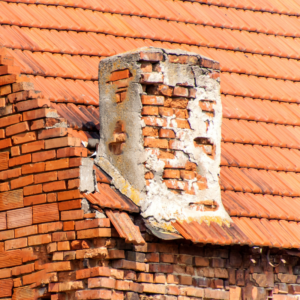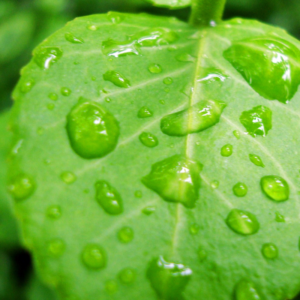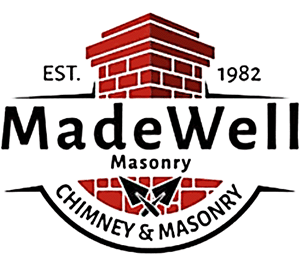When water gets into your home, creeping its way into places it shouldn’t be, it can be a nightmare to deal with. The damage it can cause can cost you lots of time and money, and that’s on top of the headache of dealing with it all. And, unfortunately, one of the easiest ways for water to enter is through an unprotected chimney.
But there’s good news for those in Montgomery County. At Madewell Masonry & Chimney, we know the importance of keeping your home and fireplace dry, and we specialize in making sure your chimney is keeping water out with every rainy season.
Now, there’s lots we can do in terms of chimney leak prevention, but waterproofing your chimney is one of the best ways to keep your masonry in good condition for the long haul. What exactly is chimney waterproofing, though? And why is it important? We’re here to answer your questions.
What Is Chimney Waterproofing? Why Is Waterproofing Important?
 A chimney plays a vital part in safely operating a fireplace or stove. It allows smoke to rise up and out of the house, so that you can enjoy all the benefits of having a cozy fire in your living room. And, in addition to letting smoke out a chimney, it also plays an important role in not letting water in – if it’s well-maintained.
A chimney plays a vital part in safely operating a fireplace or stove. It allows smoke to rise up and out of the house, so that you can enjoy all the benefits of having a cozy fire in your living room. And, in addition to letting smoke out a chimney, it also plays an important role in not letting water in – if it’s well-maintained.
There are many components on a chimney that work together to make sure water is directed away from the inside of your home, and one of these is your reliable masonry walls. When well-protected, brickwork can keep out moisture and other debris for years. But when not, it can crumble and leave the rest of your system vulnerable.
Cue chimney waterproofing. This is essentially the act of putting a protective barrier or sealant on your bricks and mortar, so water can’t soak into them and wreak havoc.
What Are Some Signs My Chimney Needs Waterproofing?
There are a number of things that can indicate it’s time to waterproof your chimney. Here are a few of them…
Leaking Water
If you notice signs of water leaking in or around your fireplace or chimney it means water is getting in where it shouldn’t be. The sooner this can be repaired, the cheaper it will be. Once water is inside, it can quickly cause costly damage to your home, so if you notice any of the following, action needs to be taken right away:
- moisture in your firebox
- a damp or musty smell coming from your fireplace
- brown or yellow water spots on the walls or ceiling near your chimney
- cracks in your flue
Book repairs first, then have our techs apply a waterproofing sealant, so you don’t face issues again down the lin.
Efflorescence On Your Masonry
When water penetrates masonry, the water can collect the natural salts and minerals within it. When it evaporates, it leaves behind a white, chalky residue called efflorescence. If you see this residue on the outside of your chimney it means that water is being absorbed by your masonry, and it needs to be sealed before costly damages start to occur.
Cracks & Crumbling
Over time, water can erode masonry. If you spot cracks in your brick and mortar or weak spots that are crumbling away, then your chimney is weakening and becoming even more susceptible to water’s damaging effects. Having your chimney professionally waterproofed will include repairing damage already done, and then sealing your masonry so further damage from water is defended against down the line.
How Does Water Damage a Chimney?
 On the surface, it might seem silly to think that water could pose such a threat to one of the sturdiest parts of your home. The truth is, however, that brick and mortar are naturally absorbent – and, while strong and sturdy, can be susceptible to collecting water. The tiny pores within masonry will eventually be filled with water if they aren’t sealed. This exposes your chimney to the effects of the freeze/thaw process.
On the surface, it might seem silly to think that water could pose such a threat to one of the sturdiest parts of your home. The truth is, however, that brick and mortar are naturally absorbent – and, while strong and sturdy, can be susceptible to collecting water. The tiny pores within masonry will eventually be filled with water if they aren’t sealed. This exposes your chimney to the effects of the freeze/thaw process.
The freeze/thaw process is a vicious cycle set on by naturally occurring events that will force even the strongest masonry work to crumble. When water occupies the tiny pores in brick and mortar, it will eventually freeze when the temperature drops. As it freezes, it expands and puts pressure on those tiny pores, causing them to widen and crack. And when it melts again in warmer weather, these newly broadened pores take on more water. …and thus the cycle continues.
If nothing is done to stop the freeze/thaw process, masonry will be forced to deteriorate to the point of becoming a danger to your house and anyone living in it. Fortunately, this process can be prevented by waterproofing your masonry and sealing it against moisture.
Can I DIY Chimney Waterproofing?
Waterproofing masonry requires expert attention – there’s just no getting around it. While retail stores make products available that claim to keep water out, these are almost always created for small jobs and need reapplied on a constant basis. They also often fail to be vapor-permeable, which means that water gets trapped inside and is unable to evaporate – ultimately doing more harm than good.
Combat Moisture By Working With Us
The professionals here at Madewell Masonry & Chimney have the training, experience, and expertise to know exactly what type of water repellent is best for defending against moisture. In addition, our professional eyes can spot weaknesses in your chimney and get them repaired right away.
Don’t stress the water this spring season. Call Madewell Masonry & Chimney at 901-443-1036 today or schedule your waterproofing job online. You’ll be glad you did.

Recent Comments